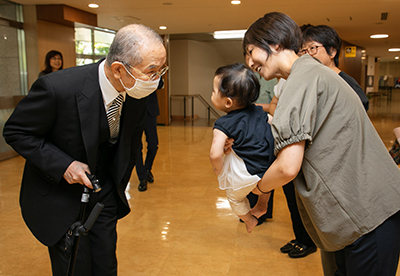A Harmony Played by Everyone Part One: Division and Harmony
November 2025

We Human Beings Have No Other Place to Go
After the founding of Rissho Kosei-kai, Founder Nikkyo Niwano, whose birthday will be celebrated this month, constantly prayed for harmony among humanity and for world peace, and when he was eighty-eight years old, the same age that I am now, he spoke of his intention to “continue living the kind of life that is itself a form of making donations to other people.”
However, in every age, there are people who complain when things do not go their way, hate people they disagree with, and for the sake of their own self-interest, have no qualms about disrupting the harmony of the group, or beating down their opponents, or even dividing their society or their country. Especially now, looking at the reality unfolding all over the world, I cannot help but feel that things important to humanity are being forgotten.
The first of these important things is the principle that we are all causing each other to live and mutually supporting each other in the midst of various connections and relationships.
The former American astronaut Rusty Schweickart, whose public lecture I attended some time ago, said that “once a human being has experienced space, they can never be the same person as before.” The Japanese astronaut Naoko Yamazaki confirmed this by describing Earth’s beauty, as seen from space, and the love she felt for it when she returned, as well as her realization that “everything on this Earth is sustained by many kinds of balance” and “that’s why it’s so sad when humans fight against each other, because when viewed from space, the Earth is truly one spaceship” (Chugai Nippo, January 27, 2016).
Wally Schirra, one of America’s first astronauts, pointed out something important that we should be aware of now: “I left Earth three times and found no other place to go. Please take care of Spaceship Earth.” When we hurt each other and destroy harmony, we only further the destruction of the global environment’s natural order, beckoning the self-destruction of humanity.
Taking to Heart “Make Yourself the Light, Make the Dharma Your Light”
If we sent photographs of Earth seen from space to politicians around the world and encouraged them to become aware of where our lives come from and the laws of Nature that govern our lives, would it be too optimistic to think some might conclude, “This is no time for war”? Well, at the very least, those of us who study the teachings of the Buddha are already learning the importance of the Earth as well as teachings that help us avoid conflict and division and bring about harmony.
We are taught that if we know the truth that all things are constantly changing (impermanence), that all things arise through causes and conditions, and that we exist in relationships of mutual dependence (selflessness, emptiness) and if through these truths we awaken to the miracle that is our own lives and to gratitude for the lives we are receiving, then we will not be burned by the flames of anger and greed (tranquil extinguishment). Founder Niwano gave concrete expression to this tranquil extinguishment when he wrote: “We care for one another, show consideration for each other, take the hand of those who are lagging behind, lend strength to those who lack it and, while keeping our balance, walk together with them. If all humanity could live like this, we would experience great peace while leading vibrant lives of creativity and progress.” We should hope and pray that this will be the way of things—that we will rely upon our own minds (make ourselves the light); take refuge in the principles of this world (make the Dharma our light); reach out to and help those around us who are struggling; show sympathy, even for the plight of people with whom we have no direct connection; and practice doing whatever we can for others. We could call these actions the “peaceful practices” of every person who strives for a world of tranquility.
Founder Niwano also called upon us to “take the initiative and open the window yourself before complaining about how dark it is in the room.” He went on to say, “Shouldn’t we who have heard the teachings of Shakyamuni take the initiative and open the windows of people’s hearts? Let’s hold high the lamp of the Buddha’s teachings in the darkness of ignorance”—words that have never resonated more powerfully than they do right now.




